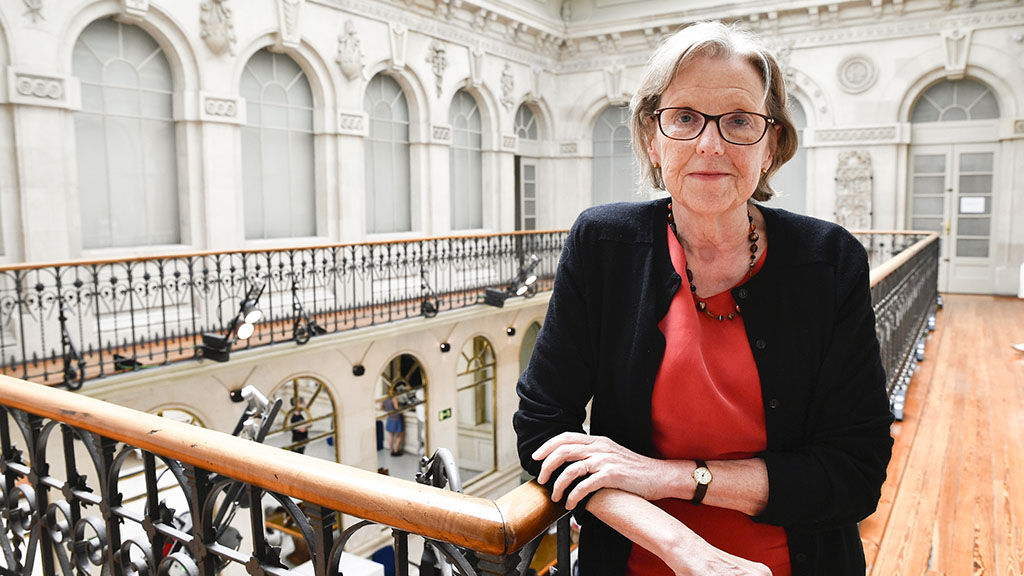
Georgina Mace, 2018 Frontiers of Knowledge Laureate in Ecology and Conservation Biology, dies aged 67
Professor Georgina Mace, winner of the 2018 BBVA Foundation Frontiers of Knowledge Award in Ecology and Conservation Biology, has died at the age of 67. The British ecologist played a decisive role in documenting global biodiversity decline by defining the scientific criteria for assigning species to each category of threat in the famous Red List of the International Union for the Conservation of Nature (IUCN).
21 September, 2020
Professor Mace shared the Frontiers Award with her U.S. colleague Gretchen Daily for what the committee called their “visionary” work as “leaders in documenting the alarming decline in global biodiversity in the midst of our planet’s sixth mass extinction event,” and in developing “policy and economic instruments” to confront this ecological crisis.
When the IUCN’s Red List first came into use in the 1960s, it was drawn up on the sole basis of experts’ subjective recommendations. This was before Mace stepped in during the late 1980s and early 1990s, coordinating the effort to define ecological parameters that would indicate a relatively high risk of species extinction; factors like population size, the rate at which the population is declining, area of distribution and the extent to which this area is fragmented. The Red List was adopted as a yardstick for conservation policies in 2005, and now includes information on over 90,000 species.
After her work on the Red List, Mace turned her research attention to the concept of ecosystem services. “One of the reasons that we worry about species going extinct is that the wellbeing of many people worldwide depends on having natural communities of species interacting and ecosystems functioning in a relatively robust way,” said Mace shortly after winning the Frontiers Award. “For without functioning natural systems, human societies would lose out on multiple benefits that we now take for granted.”
Mace was referring here not only to the evident value to the economy of services like pollination or natural pest control, but to what she described as “value in the broadest sense, that is, the fundamental contributions that nature makes to human wellbeing,” including aesthetic and cultural values, and the benefits for our physical and mental health.
In a video interview just hours after the award was announced, Professor Mace warned that “the relentless destruction of biodiversity has left us with an exhausted planet.”
The “infinite value” of nature
Biodiversity-mediated services like nutrient cycling or the water cycle are, she insisted, “essential processes of the Earth system, without which life itself would not be possible.” Their value, therefore, is infinite.
Born in London in 1953, Mace earned a BSc in Zoology from the University of Liverpool and a PhD in Evolutionary Ecology from the University of Sussex. Her research career took her to the Smithsonian Institution (United States), the University of Newcastle-upon-Tyne and the Zoological Society of London, where she was Director of Science from 2000 to 2006.
From 2006 to 2012, she was Director of the NERC Centre for Population Biology at Imperial College London. In 2012, she was appointed Professor of Biodiversity and Ecosystems at University College London, founding its Centre for Biodiversity and Environment Research, which she also headed until 2018. Georgina Mace was active on numerous committees in Britain and abroad, including the Council of the Royal Society, the Natural Capital Committee of the UK Government and various commissions of the International Union for the Conservation of Nature, as well as working on the UN’s Millennium Ecosystem Assessment.
Despite the depth of the crisis, Professor Mace held on to the belief that the international community would act in time to halt the sixth great extinction: “Conserving world nature is not a luxury, it is a necessity. People have developed and evolved by building an intimate relationship with nature, and it is not at all clear that we can survive and thrive on a changing planet unless we take that relationship seriously. The good news is that all the analyses suggest we have the scientific tools necessary to reverse the current biodiversity crisis.”

